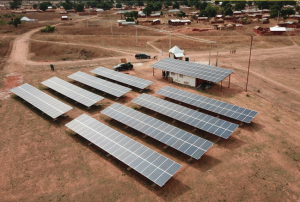Key stakeholders in Nigeria’s electricity sector have agreed to work together to address the several challenges facing the expansion of mini grids in the country.

Rising from a high-level policy dialogue themed: “Sustainability, Inclusiveness, and Governance of Mini grids in Africa (SIGMA)”, the industry leaders bemoaned the slow pace of growth in electricity access, especially using decentralised renewable energy solutions.
The event, hosted by the International Centre for Energy, Environment and Development (ICEED), provided a platform to present and validate the findings from a multi-year, multi-country UK-funded SIGMA project.
In his opening remarks, Ewah Eleri, the Nigeria Team Leader, expressed concern over the current scale of mini grids in Nigeria. Eleri pointed out that Nigeria requires at least one million and five hundred new connections annually over the next decade to close the current electricity access gap.
He said: “To meet the scale of the electricity access challenge, Nigeria needs to grow electricity supply by seven times the current available electricity. In capacity terms, we need to expand our electricity supply to 42 gigawatts, almost ten times what is available today. A significant amount of this component must be represented by decentralized renewable energy options. It is important that we scale up the ambition for mini grids in Nigeria to help in closing the current electricity access gap.”
While presenting the key findings of the research project, Temilade Sesan, the Co-Investigator of the project in Nigeria and lecturer at the Centre for Petroleum, Energy Economics and Law at the University of Ibadan, pointed out that Nigeria must re-evaluate the role of market forces and government in delivering electricity access through mini grids.
Sesan said: “Today, the technical, financial and environmental sustainability of mini-grid development in Nigeria is questionable. It is also uncertain that the benefits from the increasing interest in mini-grids are spread evenly, especially as it affects women. We therefore must recast the role of government in enabling access. That’s why governance is at the heart of delivering sustainable and equitable to mini grids.”
In his remarks, the Director, Rural Electrification Fund, Anthony Akene, underscored the significance of mini-grids in powering rural communities, particularly those situated in remote and hard-to-reach areas. However, he pointed out that the mini-grid sector continues to grapple with substantial challenges, including issues related to low-income levels and the lack of technical expertise in local communities.
His words: “Given the current exchange rate situation, the cost of imported solar energy components, such as lithium batteries, inverters, charge controllers and panels are soaring by the day. This raises questions about the long-term sustainability and maintenance of these projects in the rural communities. This therefore calls for greater intervention by government and other stakeholders.”
During his speech, the Deputy Chairman of the House of Representatives Committee on Power, Joshua Gana, thanked the organisers of the policy dialogue. According to him, the forum provided a valuable opportunity to engage stakeholders in seeking solutions to the challenges of electricity access.
Gana underscored the critical role of collaborative efforts among government agencies, private sector entities, and local communities in fostering the successful execution of mini-grid initiatives nationwide. He reiterated the commitment of the House of Representatives in leading legislative efforts to expanding electricity access to rural communities.
Senator Yunus Akintunde, Chairman of the Senate Committee on the Environment, emphasised the role of decentralised electricity governance in expanding energy access. According to him, governance and institutions are key to expanding access, especially in rural areas.
“A situation where all agencies responsible for electricity access are located at the federal level cannot be acceptable. We need electricity agencies at the local government level, just the way we have local authority over basic education and primary healthcare. This will facilitate effective governance, planning and monitoring of mini-grid development in the country,” he concluded.
The high-level policy dialogue was attended by senior officials of the Ministry of Power, Rural Electrification Agency, National Climate Change Commission, the Senate, House of Representatives, the Bank of Industry, electricity distribution companies, mini-grid operators and civil society organisations.
